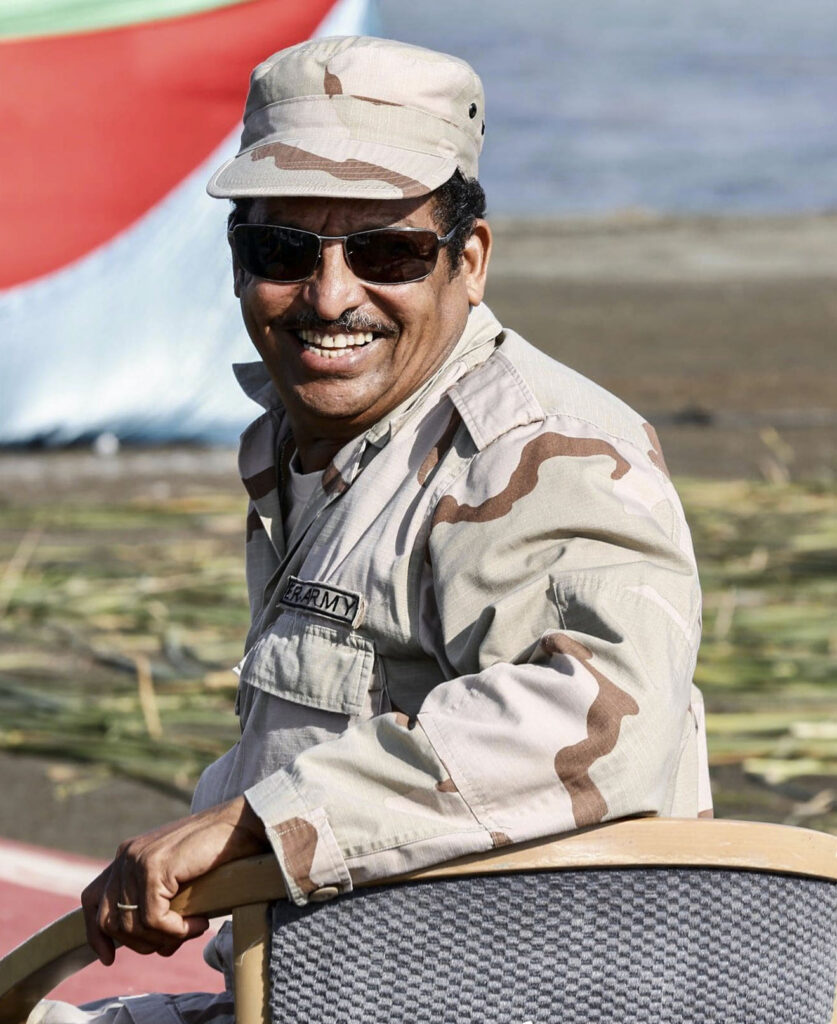A man stands in front of his destroyed house in the village of Bisober in Ethiopia's Tigray region (Photo: Eduardo Soteras/AFP via Getty Images)
The United States this week imposed sanctions on Eritrea’s army chief for human rights abuses in Ethiopia’s war-scarred Tigray region.
The move by the US treasury department against General Filipos Woldeyohannes, chief of staff of the Eritrean Defence Forces (EDF), comes amid reports that Eritrea has sent reinforcements to parts of Tigray as fighting escalates.
Forces under Filipos’ command are responsible for “massacres, looting, and sexual assaults,” the treasury department said in a statement.
“EDF troops have raped, tortured, and executed civilians; they have also destroyed property and ransacked businesses,” it said.
“The EDF have purposely shot civilians in the street and carried out systematic house-to-house searches, executing men and boys, and have forcibly evicted Tigrayan families from their residences and taken over their houses and property.”
Eritrea angrily rejected what it called “utterly baseless allegations and blackmail”.
“This is not, indeed, the first time for the US administration to float such baseless smear campaigns against Eritrea,” the foreign ministry said. “In the circumstances, Eritrea calls on the US administration to bring the case to an independent adjudication if it indeed has facts to prove its false allegations.”
The treasury department said any property or interests of Woldeyohannes in the US would be frozen and Americans barred from conducting any business with him.
US secretary of state Antony Blinken issued a statement saying the US “condemns in the strongest terms human rights violations and abuses in Ethiopia, including those involving the killings, forced removals, and systemic sexual violence”.
Blinken called on the Eritrean government to “withdraw its military forces immediately and permanently from Ethiopia”.
“At the same time, the United States continues to urge all parties to the conflict, including the Tigray People’s Liberation Front (TPLF), to end abuses against civilians, take steps to de-escalate the conflict, allow for unimpeded humanitarian access, and commit to a negotiated ceasefire,” he said.
Blinken expressed concern that large numbers of the EDF have re-entered Ethiopia after withdrawing in June.
He called on the United Nations security council and members of the international community to “come together to push for a peaceful resolution of this ongoing conflict”.
Ethiopia’s prime minister, Abiy Ahmed, sent troops into Tigray in November to topple the regional ruling party, the TPLF.
The 2019 Nobel Peace Prize winner said the move came in response to TPLF attacks on federal army camps.
For months, the Ethiopian and Eritrean governments denied Eritreans were involved in the fighting, contradicting testimony from residents, rights groups, aid workers, diplomats and even some Ethiopian civilian and military officials.
Abiy finally acknowledged the Eritreans’ presence in March and vowed soon after that they would leave Tigray.
Eritrea promised to pull out of the region in April, but that never fully happened.
The war took a stunning turn in June after pro-TPLF forces — which were driven out of Tigray’s cities and towns in November — retook the regional capital, Mekele.
The TPLF then launched an offensive into the neighbouring Amhara and Afar regions and vowed to reclaim western and southern Tigray, which were occupied by Amhara forces in the war’s early stages.
An internal European Union document dated August 20 said Eritrean troops were “present in western Tigray, where they have taken up defensive positions with tanks and artillery around Adi Goshu and Humera, and possibly also along the border with Sudan”.
 Condemned: The United States has imposed sanctions on General Filipos Woldeyohannes, head of the Eritrean Defence Forces. He is accused of commanding forces responsible for destruction in Ethiopia’s Tigray region
Condemned: The United States has imposed sanctions on General Filipos Woldeyohannes, head of the Eritrean Defence Forces. He is accused of commanding forces responsible for destruction in Ethiopia’s Tigray region
The document also cited reports that Eritrea had sent reinforcements to western Tigray in the past days while continuing to occupy a strip of territory in northern Tigray.
The conflict in northern Ethiopia has killed thousands and pushed hundreds of thousands of people into famine-like conditions, according to the UN.
Tigray’s pre-war government voiced alarm earlier this week about the plight of refugees in the region, saying only 10% of internally displaced people in Shire, Adwa, Mekelle, Aksum and Adigrat had access to healthcare or water.
The situation is exacerbated by the rainy season and the potential spread of cholera and other diseases.
The chief of the US Agency for International Development, Samantha Power, last week accused Ethiopia of blocking humanitarian aid to the region, a claim Abiy’s spokeswoman denied.
The treasury department statement echoed Power’s allegation and cited a call from Abiy for all capable Ethiopians to mobilise in support of the war effort including by joining the armed forces.“These escalatory actions risk furthering a severe humanitarian crisis,” treasury said. — AFP